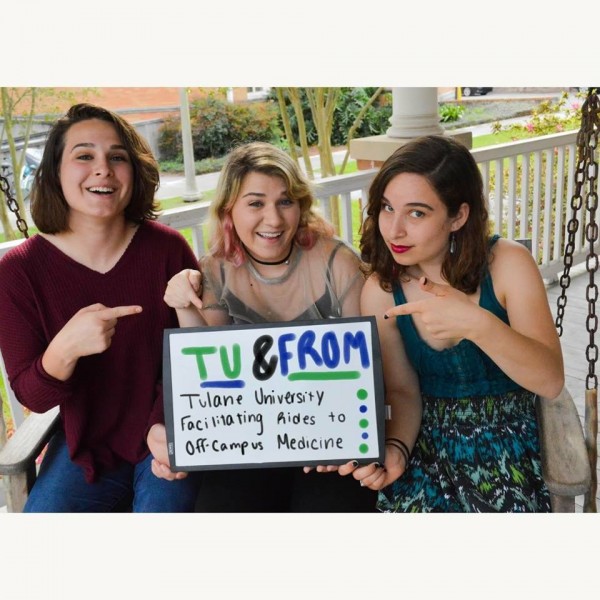TU and FROM seeks to increase access to off-campus health care

Courtesy of TU and FROM and Christina Krisberg
(From left to right) Eva Dils, Corley Miller and Sarah Levison pose with a sign advertising the TU and FROM campaign. The program aims to increase access to off-campus health care providers for students.
This week, three students introduced the Tulane University Facilitating Rides to Off-campus Medicine, or the TU and FROM, campaign to help students access medical services off campus.
The campaign began last summer when senior Sarah Levinson approached Corley Miller, senior and Undergraduate Student Government director of student health and wellness, about the idea for university-sponsored transportation to off-campus medical appointments.
Levinson was referred to a doctor off campus for an ongoing medical concern and said that having to take an Uber alone to her appointment was “a little bit traumatic and cost-prohibitive.” The experience gave her the idea that would later become TU and FROM.
The need for this transportation service stems from the number of students referred to off-campus health care providers. In the fall 2016 semester, 659 students were referred to off-campus appointments by the Student Health Center, Tulane Medical Center downtown and the preventative clinic, according to Miller.
Four hundred students were referred to off-campus appointments by Counseling and Psychological Services in the 2015-16 academic year, according to Miller, and the CAPS-advised mental health professionals are located an average of one to four miles from campus.
Miller came up with the idea to incorporate TU and FROM, which was previously named Appointments without Borders but was changed for clarity, onto the existing Tulane platform that allows students to schedule shuttle rides. Currently, students can visit rides.tulane.edu and request transportation for service learning, public service internships, Community Action Council of Tulane University Students events and federal work study.
After speaking with administrators and relevant faculty and staff, Miller and Levinson brought on freshman Eva Dils, mental health vice chair of Student Health Advisory Committee, to help work on the logistics of the program and bring in a mental health focus.
Dils said that she sees the program as beneficial to students who use CAPS and are referred to off-campus mental health care providers but cannot always access those appointments.
“Now that we are getting to the point where destigmatization [of mental health] is sort of becoming effective and people are seeking out mental health care, we need to provide ways, and we need to make sure that people are actually getting that health care,” Dils said.
The campaign has launched a social media campaign and online petition, which had 291 signatures at the time of this article’s publication. Miller, Levison and Dils plan to collect personal narratives and table on McAlister Drive next week to gather student input.
USG School of Public Health Senator Caroline Scott also introduced a resolution to create a transportation system for off-campus medical appointments at Tuesday’s USG senate meeting. The resolution sponsored by Miller and 17 other USG members passed unanimously.
The resolution called for Tulane Shuttles and Transportation to “provide the additional information needed to create a successful pilot program of a system of off-campus transportation for medical appointments” and encouraged that the pilot program be implemented by Aug. 28, 2017.
Once the pilot program launches this fall, Tulane will be the first school to implement a university-sponsored service of this kind.
“If a system like this were to work, and we would be a pioneer in this, then it would gain momentum in other places,” Levinson said. “… It would be a really great thing for this to spread to different universities as well.”
Many of the students and community members that have signed the TU and FROM petition echo the concerns and hopes of Levinson, Miller and Dils. One such student, named Danielle F. on her website entry, wrote about being unable to spend the money needed to get to her off-campus appointments and added that “this service would mean the world for me and would honestly be a step in bettering the university’s support of its students with mental health issues.”
The passing of the resolution and continued collaboration with students may mean that students will be able to access health care in efficient and cost-effective ways, according to Dils.
“There is just so much need, and I think that if people are willing to seek help, then people deserve to get that help.”
Your donation will support the student journalists of Tulane University. Your contribution will allow us to purchase equipment and cover our annual website hosting costs.


